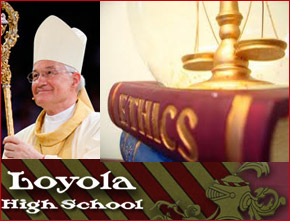It argued successfully in court that the ERC methodology, which claims to be neutral, is actually based in philosophical relativism — a position directly at odds with the school’s Catholic character and mission. As well, Loyola argued that its own religion and ethics courses meet all of the objectives of the ERC program, as well as parents’ expectations of a Catholic education for their children.
The judge was convinced. He ruled that forcing Loyola to follow the ministry teaching guidelines violates its religion under the Quebec Charter of Rights. “In this age of the respect of fundamental rights, of tolerance, reasonable accommodation and multiculturalism, the attitude adopted by the [education] minister is surprising,” wrote the judge.
He also made reference to the mention of God in the preamble of the Canadian Charter. “Canadian democratic society is based on principles recognizing the supremacy of God and the primacy of law — both of which benefit from constitutional protection,” he wrote. The judge based his decision largely on the expert testimony of Douglas Farrow, a McGill University professor in religious studies.
Not a showdown
Though pleased with the judgment, Loyola principal Paul Donovan told the Catholic Times that the school has never wanted this issue “to become a fight between Loyola and the government.” He added: “Essentially, it is an argument about what is the right way to proceed in this evolving society, and we believe that Loyola has a part to play in this.” Donovan said the school has always wanted to discuss the matter with the government, and is still open to the possibility, but the government has never responded to the invitation. “We would like to sit down with them and try to reach an understanding . . . but it has become a conversation between lawyers.”
The ruling sets an interesting precedent in recognizing the religious rights of an institution. Constitutional lawyers and political philosophers have noted that, in the last 20 years, Canadian courts have generally ruled in favour of individual rights over institutional rights in all matters, including religion.
Bishops react
Ten days after the Dugré ruling, the Quebec bishops issued a statement welcoming the court’s decision. “This judgment sheds new light on this very complex question and opens new avenues for those who are interested in establishing, in our schools, a genuine education regarding pluralism and religious diversity,” wrote Bishop Martin Veillette, president of the Assembly of Quebec Catholic Bishops.
“The development of such a course by Loyola validates the point of view that recognition of the other and the pursuit of the common good — two important objectives of the ERC course — are not threatened … in a serious faith setting,” he continued, adding: “Knowledge of self and respect for the other go together, and no one is better prepared to welcome differences in matters of faith and beliefs than he or she who has learned to find, in their own spiritual and religious identity, the foundations of hospitality, respect and dialogue.”
– Courtesy of Catholic Times Montreal. Additional reporting by David F. Dawes. Please do not reprint without permission.
